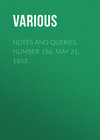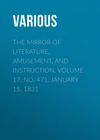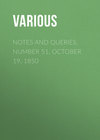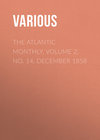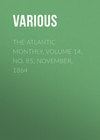Loe raamatut: «Blackwood's Edinburgh Magazine - Volume 62, No. 384, October 1847», lehekülg 6
BEETHOVEN
When the reproachful accents ceased, Balsamo felt his feet once more pressing the earth, and the breezes rustling against his domino. He was wandering in the garden of what is termed the Schwarzpanier House, situated on a slope or glacis in the outskirts of Wahring. The evening was so far advanced, that candles already twinkled from the upper windows of the building, while the fires of the kitchens checkered the shrubs and gravel with patches of glaring light. Through the flowerbeds, and along the intricate paths of the shrubbery, the Alchemist strolled at a languid pace, musing upon the things he had already witnessed, when his vigilant ears caught the tones of a musical instrument. Although it was scarcely audible from the distance, Cagliostro was struck by the extreme beauty and espièglerie of the performance. He hurried forward in the direction from which the sounds proceeded, and at each step they became more distinguishable and bewitching. After a momentary feeling of indecision when he reached the walls of the Schwarzpanier, the Alchemist ascended a flight of steps, and passed through the open casement of a French-window into a modest sitting-room. The musician whose skill had attracted him, was seated in the gray twilight at a piano. Cagliostro scarcely noticed that he was a man of short stature but of muscular proportions; he scarcely remarked, indeed, either the apartment or its occupant; his whole consciousness was absorbed in the melody that streamed from the instrument.
At first, the fingers of the player seemed to frolic over the keys, as though they toyed with the vibrations of the strings. The sounds were sportive and jocund; they rippled like laughter; they were capricious as the merriment of a coquette. Then they merged into a sweet and warbling cadence—a cadence of inimitable tenderness, the very suavity of which was rendered more piquant by its lavish variations. The measure changed, with an abrupt fling of the treble-hand: it gushed into an air quaint and sprightly as the dance of Puck—comic—odd—sparkling on the ear like zig-zags: it threw out a shower of notes; it was the voice of agility and merriment; it was grotesque and fitful, droll in its absurd confusion, and yet nimble, in its amazing ingenuity. Gradually, however, the humorous movement resolved itself into a strain of preternatural wildness—a strain that made the blood curdle, and the flesh creep, and the nerves shudder. It abounded with dark and goblin passages; it was the whirlwind blowing among the crags of the Jungfrau, and swarming with the forms and cries of the witches of the Walpurgis; it was Eurydice, traversing the corridors of hell; it was midnight over the wilderness, with the clouds drifting before the moon; it was a hurricane on the deep sea; it was every thing horrible, wierdlike, and tumultuous. And through the very fury of these passages there would start tones of ravishing and gentle beauty—the incense of an adoring heart wafted to the black heavens through the lightnings and lamentations of Nineveh. Again the musician changed the purpose of his improvisation; it was no longer dismal and appalling, it was pathetic. The instrument became, as it were, the organ of sadness, it became eloquent with an inarticulate wo; it was a breast bursting with affliction, a voice broken with sorrow, a soul dissolving with emotions. Then the variable harmonies rose from pensiveness into frenzy, from frenzy into the noise and the shocks of a great battle; they swelled to the din of contending armies, to the storm and vicissitudes of warlike deeds, and soared at last into a pæan such as that of victorious legions when—
"Gaily to glory they come,
Like a king in his pomp,
To the blast of the tromp,
And the roar of the mighty drum!"
As the triumphant tones of the instrument rolled up from its recesses, and filled the apartment with a torrent of majestic sounds, as the musician swayed to and fro in the enthusiasm of his sublime inspirations, and enhanced the divine symphony by the crash of many thrilling and abrupt discords, the Rosicrucian gazed with awe upon the responsive grandeur of his countenance. The impetus of his superb imagination imparted an inconceivable dignity to every lineament, to his capacious forehead, to his broad and distended nostrils, to the fierce protrusion of his under-lip, to the mobile and generous expression of his mouth, to the tawny yellow of his complexion, to the brown depths of his noble and dilated eyes. There was something in unison with the glorious sounds that reverberated through the chamber, even in the enormous contour of his head and the gray disorder of his hair. He seemed to exult in the torrent of melody as it gushed from the piano and streamed out upon the dusk of the evening. While Cagliostro was listening in an ecstasy of admiration, he was startled by a sudden clangour among the bass-notes—the music seemed to be jumbled into confusion, and the ear was stunned by a painful and intolerable dissonance. On looking more intently, he perceived that the composer had let one hand fall abstractedly upon the key-board, while the other executed, by itself, a passage of extraordinary difficulty and involution. Then, for the first time, the thought struck him that the musician was deaf.17 Alas! the supposition was too true: Beethoven was cursed with the loss of his most precious faculty. Those who appreciate the full splendour of his gigantic genius, those who conceive, with a distinguished composer now living, that "Beethoven began where Haydn and Mozart left off;" those who coincide with an eminent critic, in saying that "the discords of Beethoven are better than the harmonies of all other musicians;" those, in fine, who worship his memory with the devotion inspired by his compositions, can sympathise in that terrible deprivation of the powers of hearing, by which his art was rendered a blank, and the latter years of his life were imbittered. They will remember with gratitude the joys they have derived from the effusions of his fruitful intellect; they will call to their recollection the joyous chorus of the prisoners in Fidelio,—the sublime and adoring hymn of the "Alleluia" in The Mount of Olives,—the matchless pomp of the Sinfonia Eroica,—the passionate beauty of the sentiment of Adelaida,—the aerial grace of his quartets and waltzes,—the thrilling and almost awful pathos of the dirge written for six trombones,—but, above all, they will recall to mind the noblest work ever conceived and perfected by composer, one of the greatest achievements of the human mind, the Mass in D. And, bearing these wonders in their memory, their hearts will ache for the doom of Ludwig Von Beethoven. None of these things, however, being known to the Rosicrucian, his sympathies were aroused solely by what he himself had heard and witnessed. Still that was more than enough to fill his whole soul with commiseration, especially as the sounds again burst in bewitching concert from the instrument, and a new inspiration lit up the visage of the musician. Cagliostro found himself, with profound sorrow, returning into the silent darkness, and the solemn Voice stealing, for the last time, into his brain.
"Behold, Balsamo," it said, "the pleasures that may vanish with the loss of hearing. Behold, and shudder at the remembrance of thy blasphemies. Recognise the goodness of Omnipotence in thy five senses—value them beyond either rank, or wealth, or dignity, or fame, or power,—value them as the five mysterious talismans of human life; and, in their virtuous employment, know that earthly happiness is attainable!"
While these words were resounding in his mind, the Rosicrucian felt himself carried, with inconceivable swiftness, through the atmosphere. Immediately they ceased he became motionless, though he was still enveloped in the shadows of night. All that had recently occurred to him,—all the strange and moving circumstances of which he had been a spectator, then thronged upon his recollection, and stirred his heart with astonishment. His imagination responded to his amazement. He revisited again, in thought, the blooming grove of Capreæ, the pageantries of Cesarea, the green lanes of Buckingham, the luxurious salon of Paris, and the twilight of the garden of Wahring. Italian beauty lived again in his remembrance, but a beauty marred by licentiousness and cruelty. He seemed to behold once more the multitudes of Palestine, the landscapes of England, the dainty splendours of France, and the tranquil homes of Germany. Gradually, however, his reflections became less incoherent, and the meaning of the vision appeared to evolve itself before him, in inductions fraught at once with reproach and consolation. Coupling together the truths enunciated by the Voice of his unseen visitant, and the spectacles revealed to him in succession through its agency, the Alchemist bethought himself whether his original impressions, as to the condition of humanity, might not, in a great measure, have been erroneous. What he had just witnessed assured him, in an unanswerable manner, that overt crimes or overt virtues were merely the good or evil employment of one or other of the five senses; that they were the bright and black spots upon the spiritual nature of man, the faculæ and the maculæ, as it were, on the disc of his conscience. Satisfied, therefore, that the purity or depravity of every mortal was merely the consequence of the different purpose to which their senses had been directed, the Rosicrucian perceived the intimate relationship subsisting between the immaterial being and the physical organs. He perceived especially that those organs were the channels through which that immaterial portion of humanity was brought into communication with a material existence, was compelled to endure its miseries, or was enabled to appreciate its enjoyments. In this he recognised the veracity of that solemn assurance, that happiness is accessible, even on this earth, to all who use their senses with a virtuous discrimination. Nor had this consolatory truth been enforced merely by a barren asseveration. Balsamo had been taught the inestimable value of those senses, and the penalties of such as abused them by their vices. Five incidents, most touching, or most appalling, had reminded him of the exquisite pleasures derivable from created things, through the eyes, through the nostrils, through the ears, through the palate, and through the nerves. He had seen the anguish, moreover, of those who suffered from the deprivation of either sense, or of those who were tortured by the result of their own heinous misapplication. He had seen this in the insanity of Tiberius, in the torments of Agrippa, in the sadness of Milton, in the desolation of Mirabeau, and even in the philosophic sorrows of Beethoven. The emperor, the tetrarch, the poet, the demagogue, and the musician, crowded upon his memory, and appealed to his judgment with the same melancholy distinctness. Still the villainous predilections of the Rosicrucian contended for the mastery, although his intellect recognised the wisdom of the Vision. A fierce strife arose between his passions and his reason.
Suddenly his eyes opened to the splendour of an autumn morning; and as the sunlight poured along the Boulevard de la Madeleine, as it gilded every blade of grass in the paddock, and streamed in golden pencils through the open window of the cottage, it glittered upon his cheek like raindrops.
Cagliostro was weeping.
MAGA IN AMERICA
New York, August 1847.
My Dear Godfrey—You will laugh when you hear into what a practical blunder I was led, by a desire to gratify your curiosity concerning Maga's Icon in America. I wondered you should ask me for a description, when it was so easy to have ordered out the thing itself; and so resolved to save myself the trouble of writing a long story, by duly exporting a specimen of the American Ebony, from which you might form your own conclusions as to its counterfeit merits, and its supposed relations to the great question of international copyright. Segnius irritant—you know! What disciple of old Plunkett's will ever forget the difference between the demissa per aurem, and
——"quæ sunt oculis subjecta fidelibus!"
I have always maintained that his illustration of this great principle gave Dickens the hint of his Dotheboy's Hall. You remember, doubtless, poor Harry Farmar's false quantity, and how Plunkett made him peel onions till he cried his eyes out; asserting his confidence in Horace's maxim, and that he had found the usual box on the ear quite incapable of any exciting effect on Harry's mind. Who would have said that the same Harry, surviving the operation, would have lived to hunt bisons on the prairies of Western America, after riding on elephants in India, and bestriding a camel's hump through the waste places of Edom! Harry's wandering mind has developed as vagabond a habit of life as ever his prophetic instructor ventured to predict; but he vows himself cured at last, and that, if he ever sets foot again on England's terra firma, he will at once become one of the manly hearts that guard the fair, and settle down in contented conjugation. He it was, then, who offered to be the bearer to yourself at C—— of any despatches, or parcels, I might choose to send; but he affected to think me so thoroughly Americanised, that he entered a caveat against my loading him with a consignment of bowie knives or cotton-bales. A nicely packthreaded parcel was accordingly put up, and duly adorned with your most Saxon name and address, in the delusive expectation that none but your own hands would presume
"——to set the imprison'd wranglers free
And give them voice and utterance once again."
I was doomed to be quickly undeceived; and as I doubt not Harry will be giving you his own version of the affair, over a glass of wine, some three weeks hence, at the Hall, you shall know beforehand how much to allow, in this matter, for his habitual unveracity, or rather love of romance.
I waited on him yesterday and presented the packet; but you should have seen him start, when I happened to mention its contents. Not the captors of Guido Fawkes bounced with more consternation, when that eminent pyrotechnist proposed to touch off his gunpowder for their especial gratification and amusement. "What!" exclaimed our mutual friend—"Have you lived so long in America, as to have forgotten the laws of a civilised and Christian land! Would you have me seized as a smuggler; posted in every newspaper as an importer of contraband goods; brutally insulted by the officers of her Majesty's Customs; and perhaps actually brought before a justice, and locked up where the only prospect would be a distant view of New South Wales!" It was in vain that I remonstrated with his eloquent horrors, at the thought of renewing his travels at government cost: he insisted that my proposal might actually have ensured the catastrophe; and from this appeal to my feelings, passed to a bold invective against literary piracy, and concluded by a generous compromise in favour of the cotton-bales, if I would pardon the warm expressions with which he found himself compelled to decline my extraordinary commission. You should have seen him, Godfrey! If he ever takes that seat in Parliament which he threatens to make the sequel of matrimony, I predict wo to the whole race of Humes, Brights, and Cobdens, should they ever start him on a subject capable of transatlantic illustration.
I could not but laugh, though, when I saw the true state of the case, at the comical scene that might have ensued, had he taken my parcel without explanations. Think of Harry's air of fearless innocence before the inspectors of imports, till from the depths of an enormous trunk comes forth a parcel, which those faithful officials at once lay bare, with the professional dexterity of a private tearing his cartridge. The officer stares, and Harry looks still more astounded, at the sight of a familiar visage, peering forth from under the wrapper, and giving mute but significant expressions of pain and displeasure. It is the head of Geordy Buchanan! It is Blackwood, imported from New York! The confounded servant of her Majesty's Customs begins to whisper contraband, and expresses a wish for the undoubted original, which you, just stepping up to welcome your friend, are enabled to supply. The fresh number from your coat-skirts, and the suspicious importation from America, are set together like the two Dromios before the duke. "Look on this picture, and on that!" Behold the two Buchanans!
"One of these men is genius to the other
——Which is the natural man,
And which the spirit? Who deciphers them?"
Harry, to prevent the coming crisis, volunteers a confession, but invites you to a comparison of the heads. With his outrageous Tory hatred of the Yankees, he, of course, declares there's no comparison; ridicules the fac-simile, and hastily seizing what he mistakes for the counterfeit, confounds the company by a quotation from the Latin of "Terence"—that very small fragment of the Eunuchus which Plunkett forced into his head through the opposite pole of his person—
"Ne comparandus hic quidem ad illum est, ille erat
Honesta facie, et liberali!"
And finally, disgusted to find that he has ascribed the more gentlemanly bearing to the American, he tosses the whole parcel into the docks, with the tardy announcement that it was my friendly consignment to yourself, as well as the very curiosity of literature which you so much desire to see. You remember, doubtless, what I did not recollect, that there is no port of entry in her Majesty's empire for the Icons of British copyright property. They come with a Frenchified air from the press of Galignani; they arrive in vulgarised costume from the cheap manufactories of New England; but the scent of the vermin is familiar to the nose of a collector of customs, and no rat-catching terrier, says my informant, ever pounces upon his Norwegian with half the gusto with which such an official snubs such an intruder. A health, I say, to the fury of this sort of Iconoclasts!
Our friend's unusual caution has saved you the excitement of the scene I have imagined, but it puts me to the necessity of substituting a hurried description for the ocular satisfaction I had proposed to send you. Who would have supposed, thirty years since, that one Maga would not be enough for the world, and that New York would be the seat of its flourishing double! Yet it is now twelve years since its twin started up on this side the water, and has been battening and fattening on the rewards of successful illegitimacy. Nay—for a portion of that period, Maga has been "three gentlemen at once." The very pirates were pirated, and undersold; and two reprints of Maga, both professing to be fac-similes, were at one time supported in America, in addition to countless republications of particular articles; such, for instance, as the tales of "Ten Thousand a-Year," and "Caleb Stukeley"! I think I hear you exclaim at such wholesale grand-larceny; but though not inclined to take up the cudgels for Reprint and Co., it is but justice to tell you what they would say in self-defence. The truth is, they would not have known what you meant, had you told them, when their republication was established, that there was any question as to the ethics of such a business. The laws not only permitted, but even encouraged the enterprise; and they do so still. The most respectable booksellers were engaged in a similar seizure of every new novel of Bulwer's, and every new work whatever, that had stood the experiment of success in England. Original copies of the Magazine were rarely imported, as the importer's charges and duties nearly doubled the first cost of each number; and besides, it was already virtually republished, its leading articles being constantly appropriated, in different ways, by editors of literary periodicals, and often by the daily newspapers. Then, it must be remembered, that England was nearly twice as far from America before the era of steamers; and that the matter of copyright was only just beginning to excite the attention of Parliament. As yet Lord Mahon had not stirred up the ministry to move foreign countries to international justice, and England was not, as now, prepared to invest their authors with all the rights she concedes to her own. It is not surprising, therefore, that Reprint and Co. commenced operations without any compunctions of conscience, and were even praised for their enterprise by honourable men. Hundreds, who could hardly forego the reading of Maga, were unable to pay for it twice what it costs in England; and I grant you, that when the first number was laid on my table at one-fourth the price of an importation, I myself was not the man to throw a pebble at the pirates, but wished them good luck and gave them my name as a subscriber. I verily believe I did so with a virtuous delight in what then struck me as a compliment to my favourite magazine; for somebody, at about the same time, had started a similar republication of other English Monthlies, and I desired to see them fairly run off the course. You will certainly concede to the Americans some credit for a discerning taste, when I add that Maga's competitors have long since been withdrawn for want of backers; and she so easily walks the field, that it begins to be a fair question whether Messrs Reprint and Co. are honestly entitled to the purse.
I have marvelled a little, I confess, that a magazine of such unmitigated Toryism, and of so uncomplimentary a tone towards America, should nevertheless gain so universal a popularity in this country. I must stand to it, Godfrey—there's a touch of the magnanimous in the affection which exists among Americans for Christopher North, and all his high Tory fraternity. Seldom approving, they always enjoy his old-fashioned prejudices; and defend in Maga what, in a book of Alison's, they would relish very little. Much is said for the kind of affectionate regard with which they welcome to their firesides its monthly returns, in the fact that it is the only foreign work which American republishers have felt themselves forced, by popular feeling, to furnish in the form of a fac-simile. It is proof of the individual interest which it possesses, and of the rich associations which it has imparted even to the simplicity of its outside. Every one wants old Ebony in its own gentlemanly wear: but much as is implied in the livery of the Edinburgh Review, and many as are its admirers among the literary freethinkers of the eastern states, it is curious that no one cares twopence to see it in any other than a semi-newspaper shape, and that Reprint and Co. have never thought of reproducing it in all the splendour of its popinjay surtout. In fact, I doubt whether it will long continue in any shape at all. Its crack article is always reprinted in another form; and oracular as its pages are deemed by the clannish provincials of Boston, its general contents seldom go down with the public. The truth is, no one honestly prefers porridge to roast-beef; and in spite of a natural leaning to buff and blue, Jonathan will not be diverted from his luxurious repasts in Maga, by anything less "hot in the mouth."
I remember that, in one of those Ambrosial Noctes, some one remarked in auld-lang-syne, that Maga is a ubiquity. The Shepherd assented, for he had seen the head of Geordy alike in the hut and the hall; beaming the same by the mirrored fire-light of the manorial villa, and "by the peat-lowe frae the ingle o' the auld clay biggin." But think, my dear Godfrey, what a flow of the decalect would have gushed from that child of the Yarrow, had he beheld, with me, the pirated Maga scattered through the length and breadth of this immense republic, and devoured with equal delight by the self-congratulating native of Massachusetts Bay, and the home-sick immigrant of Oregon. Here, too, Maga is ubiquitous. If you make your summer tour through the States of New England, and stop to visit its priggish little colleges, and biggish little schools, you shall find it on many a sophister's table, and in many a schoolboy's hands; or, ten to one, as you pass the windows of the barracks where they keep their terms, you will chance to hear some full-voiced youth adding a nasal rhetoric to Maga's pages, as he retails them, through clouds of cigar-smoke, to his assembled companions. To your surprise, you will find Maga in every library and reading-room from the Independent Union Lyceum of Jeffersonville, in New Hampshire, to the Congressional lobbies at Washington. And I assure you, they not only take it in, but they read it out and out. Often, when I have wanted but a glimpse at its leader, I have found it, like The Times at a country inn, in the grasp of some sturdy monopolist, exploring it inch by inch, and only pausing at intervals, to wipe his glasses, and renew his pinch of snuff. Along the shores of the Hudson, in those snug little villas that peep forth from the thick trees and copsewood, Maga is quite as universal, but is found in more palmy estate. There—whether your retreat from the city be to the banks of Westchester, to the glens of the Highlands, or to the table-lands that underlie the Kaatskills—your welcome you value none the less that you see volumes of old numbers in the book-case, and the number of the month already laid on the table in the hall; and you think of the hot noons they will help to wile away, after the morning's sport, and before the evening drive. In homes like these, I have usually found Blackwood a favourite with the fairer portion of American society. You shall find it lurking amongst worsteds and flower-patterns, and very often preferred to the pretty work that tasks a far prettier eye: or, stepping into the verandah to see a steamer go by, you shall pick it up from a tabouret, where it lies with a pearl-knife in its uncut pages, and the breezes playing with its parted leaves—evidently the immediate relic of some startled and disappearing fair one. Going south or west, you meet it on railways, and in steamers. It is usually the companion of such travellers as are accustomed to decline the repeated attempts of fellow-passengers to engage them in conversation or political debate, and seems to afford peculiar refreshment to those who have effected a retreat from the philanthropic assaults of travelling temperance agents, and of other affectionate inquirers as to the condition of their bodies and souls. When you reach the Carolinas, where, in default of taverns, you may always venture to make yourself the guest of a planter, and will be thanked for your visit—if you would bait at noon, and turn from the road to a hospitable-looking mansion among the pines, I'll wager that a basking Negro, without a shirt, will start up, and take charge of your horse, while the master of a thousand slaves gives you one open hand, but holds in the other the ubiquitous pages, which he has been reading in the cool of his piazza. I say then, had the Shepherd been blest with such universal experiences as mine, with what a flow of metaphor and illustrative wit would he have enlarged upon the proposition—Maga is an ubiquity. Beginning with a broadside at the literary corsairs of New York, I can fancy him bursting with indignant virtue into luxurious comparisons between the rape of the Sabines, and that of the inimitable Noctes—and then between Maga bodily, and her who in the field of Enna gathering flowers, experienced a fate most gloomy; and so on till his exuberant good-humour expands at last into an apology, as he expatiates on the tempting character of the booty, and declares, that like apples of gold to frolicsome schoolboys, so beautiful Maga, to covetous Yankees, is a thing too full of relish and of beauty to be other than pardonable plunder! Maga, like Italy, ought to be less bewitching, or better defended. What would not some of Maga's cotemporaries give, nevertheless, for the compliment of being perpetually ravished by the Goths and Vandals of Letters—the merciless anti-copyright booksellers of America? Nay—they will pout at the insinuation, and stand upon the virtue which no one believes they possess. But assure them, dear Godfrey, that they are in no conceivable danger. Maga shall growl, and they shall fawn; but the republicans will not be repulsed by the honest frankness of the one nor propitiated by the hypocritical blandishments of the others. If they doubt it, just tell them what happened with me the other day, and what I vouch for as fairly exhibiting the feeling of the most intelligent Americans. I could add many other anecdotes of the same colour and character; but I tell this as creditable to them, and illustrative of Maga's footing among them:—
I was at the reading-rooms of "The Athenæum"—a literary club-house in this city, which has grown out of a small society of scholars that existed here before the Revolution—and which, I am happy to say, is always supplied with the genuine imported Magazine. A young man, whom I had often met at the rooms, and who had the Magazine in his hand, called my attention to a palpable error in an article, that reflected pretty merrily on his countrymen. "Ha!" said I, "just like old Ebony! Why don't you banish the rabid old Tory from these most democratic tables?"
"Banish Maga!" was the reply—"what would be left fit to read?"
This incident was suggested by a touching sentence in Schindler's biography of Beethoven. After observing that the outward sense no longer co-operated with the inward mind of the great composer, and that, consequently, "the outpourings of his fancy became scarcely intelligible," Schindler continues:—"Sometimes he would lay his left hand flat upon the key-board, and thus drown, in discordant noise, the music to which his right was feelingly giving utterance."—See Life of Beethoven, Edited by Ignace Moschelles, ii. 175.
[Закрыть]












